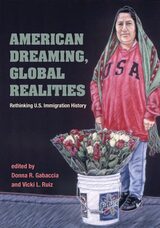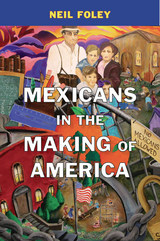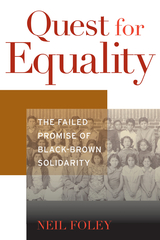
An introduction to the best from the new directions in U.S. immigration history
Representing a selection of the finest new research on immigration, American Dreaming, Global Realities explores the ways in which immigrant lives and those of their children are shaped by transnational bonds, globalization, family ties, and personal choice, and the ways in which they engender a sense of belonging and a sense of themselves as “Americans.”
American Dreaming, Global Realities considers a plurality of very specific historical, economic, regional, familial, and cultural contexts. This history reveals resistance and accommodation, both persistent older traditions and Americanization, plus the creation of new cultural forms blending old and new. The twenty-two interdisciplinary essays included in this collection explore the intricate overlapping of race, class, and gender on ethnic identity and on American citizenship.

A Choice Outstanding Academic Title of the Year
According to census projections, by 2050 nearly one in three U.S. residents will be Latino, and the overwhelming majority of these will be of Mexican descent. This dramatic demographic shift is reshaping politics, culture, and fundamental ideas about American identity. Neil Foley, a leading Mexican American historian, offers a sweeping view of the evolution of Mexican America, from a colonial outpost on Mexico’s northern frontier to a twenty-first-century people integral to the nation they have helped build.
“Compelling…Readers of all political persuasions will find Foley’s intensively researched, well-documented scholarly work an instructive, thoroughly accessible guide to the ramifications of immigration policy.”
—Publishers Weekly
“For Americans long accustomed to understanding the country’s development as an east-to-west phenomenon, Foley’s singular service is to urge us to tilt the map south-to-north and to comprehend conditions as they have been for some time and will likely be for the foreseeable future…A timely look at and appreciation of a fast-growing demographic destined to play an increasingly important role in our history.”
—Kirkus Reviews

As the United States championed principles of freedom and equality during World War II, it denied fundamental rights to many non-white citizens. In the wake of President Franklin Roosevelt’s “Good Neighbor” policy with Latin America, African American and Mexican American civil rights leaders sought ways to make that policy of respect and mutual obligations apply at home as well as abroad. They argued that a whites-only democracy not only denied constitutional protection to every citizen but also threatened the war effort and FDR’s aims.
Neil Foley examines the complex interplay among regional, national, and international politics that plagued the efforts of Mexican Americans and African Americans to find common ground in ending employment discrimination in the defense industries and school segregation in the war years and beyond. Underlying differences in organizational strength, political affiliation, class position, and level of assimilation complicated efforts by Mexican and black Americans to forge strategic alliances in their fight for economic and educational equality. The prospect of interracial cooperation foundered as Mexican American civil rights leaders saw little to gain and much to lose in joining hands with African Americans.
Over a half century later, African American and Latino civil rights organizations continue to seek solutions to relevant issues, including the persistence of de facto segregation in our public schools and the widening gap in wealth and income in America. Yet they continue to grapple with the difficulty of forging solidarity across lines of cultural, class, and racial-ethnic difference, a struggle that remains central to contemporary American life.
READERS
Browse our collection.
PUBLISHERS
See BiblioVault's publisher services.
STUDENT SERVICES
Files for college accessibility offices.
UChicago Accessibility Resources
home | accessibility | search | about | contact us
BiblioVault ® 2001 - 2024
The University of Chicago Press









